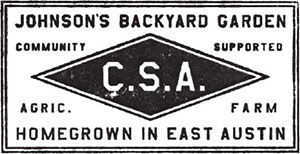
YOU ASKED, OUR HEAD FARMER, BRENTON ANSWERS!
09/07/18 — Heydon Hatcher
For the first time ever in blog history, we took to social media to gather burning questions from the masses for our Head Farmer, Brenton Johnson. You threw inquiries ranging from musical preferences to specialized farming practices, and Brenton answers them all this week. Buckle up and get ready for some exciting and insightful ANSWERS!
![]() Brenton in the greenhouse. Photo by Tamir Kalifa.
Brenton in the greenhouse. Photo by Tamir Kalifa.
What's the best produce to grow in a home garden in Texas? And when do you plant it?
It really depends on your location, especially with the amount of shade or sun. If it's summertime and sunny - tomatoes are the tastiest, but not necessarily the easiest. You have to plant them at the right time, get plenty of sun + fertility, and nail down proper watering. The easiest to cultivate in Texas heat are peppers, eggplant, okra, and basil. The hardest for home gardeners are squash and zucchini because of the insect problem. Dang squash vine borers.
What do you do with avocados after they sprout? Transplant? Leave in water?
Avocados don’t really grow well in Austin - it’s too cold here. Save yourself the trouble and don’t try to grow avocados in Austin.
When should I plant sweet potatoes?
If you want to plant early and already have your own slips - start in April. The Natural Gardener might have slips for sale in April. However, If you are making your own slips - start 6 weeks ahead of time. We usually plant them in 2 inches of sandy soil and cover them with black plastic to warm up the ground. In a couple weeks, the slip will poke through the plastic (having grown about 2/3 inches), we snag them, and then we transplant them!
Sweet potatoes take about 100 days to mature and usually finish around November. So, the last planting day would be 100 or 110 days before November.
What works best in Dallas? For a home farm or just simple plants?
For a home farm get fruit trees started. The best ones for the Dallas area would be pomegranate, fig, persimmon, and Kiefer pear.
Does a full-time farmer ever get time off?
I use to work all the time because I loved it so much. Then I realized I was working my life away and worked myself out of a marriage.
I realized over the past couple of years, I need to take time off... this summer I've been to Alabama to sail with family, and just got back from ten days in Costa Rica surfing, zip lining, and having tons of adventures with my kiddos. It's been really important for me to try and balance work with play over the past few years. I've been blessed to go on some pretty awesome little journeys. In the beginning, you are building your business and working so hard. I have been full-time farming for 10 years now. Eventually, if you build a good team, everybody can take a break sometimes and folks can cover for other people.
![]() On a recent trip to Alabama with family. Photo by Brenton Johnson.
On a recent trip to Alabama with family. Photo by Brenton Johnson.
![]() Teamwork, yeah! Photo by Scott David Gordon.
Teamwork, yeah! Photo by Scott David Gordon.
What do you think the minimum scale is for a farm to generate sustainable income for the farmer?
To be honest, a single person farm could probably make it. It's really dependent on the farmer and how good they are at making money. If you live in a good market, have strong direct sales to grocery stores and restaurants... you can definitely make a living. The better you are the smaller the farm can be.
It would desirable to at least have an acre or two, and not be SO small. As a part-time job, you can do with even less and make around $500 a week in a backyard garden selling to markets and what-have-you. Having some tools also make it less labor intensive, but with a really small space you aren't going to use (or more realistically have space for) a mini-Kubota, so you have to do it by hand which can be really tiring.
If you had a theme song, what would it be?
Rock You Like A Hurricane
What are your favorite sources of farming advice/information?
The bible for me is New Organic Grower by Eliot Coleman. Another good one is How to Grow More Vegetables: Than You Ever Thought Possible on Less Land Than You Can Imagine by John Jeavons. Finally, grab Sustainable Vegetable Production From Start-Up to Market by Grubinger. Those are all invaluable reads.
![]() Farm publications worth reading over.
Farm publications worth reading over.
What would you tell someone considering the move from backyard gardening to farming for the masses?
I will quote an old Grateful Dead song here, “keep your day job, until your night job pays.” That’s what I did at least. I worked a day job and kept my veggie job as a hobby. Then when I felt I could support my family, I made the leap. Educate yourself and talk to other farmers to get more insight. There is a great survey in the aforementioned Grubinger book that evaluates a bunch of lifestyle questions… check it out. It helps you make decisions and assesses if you are suited for farming as a career. It’s not easy running your own business... you will put in a lot more hours than if you were working for someone else.
![]() Old photos from about 10 years ago at Hergotz.
Old photos from about 10 years ago at Hergotz.
Are you laying subsurface drip, if so, how do you lift it out?
Yes, we bury it an inch deep, so it's shallow enough where we can lift it out by hand.
How do you grow lettuce and spinach in this heat?
We don’t grow spinach just yet, and we are just starting lettuce now in the fields. We don’t grow outside the recommended windows of time (fall + winter). We push it sometimes, but not too much.
Any upcoming events at the farm?
Oh yes! Save the date for our Fall Open House on Saturday, October 27th! We are also having another Volunteer Day on Saturday, September 22nd because the last one was so much fun. E-mail the farm at farm@jbgorganic.com to RSVP! Spots go fast.
Do you ever meditate?
No, but I should. Does running count?
![]() Brenton meditating?
Brenton meditating?
What’s your favorite Grateful Dead song?
I honestly don't have a favorite. What a really enjoy about the Grateful Dead when I first discovered them was the experience and all the energy. I grew up in a conservative Alabama town, and the Grateful Dead was the complete opposite of everything I knew. I didn't like the music that much in the beginning, but it grew on me over time. They introduced me to so many different types of American music. They have so many elements of rock and roll, country, blues, disco, jazz in their music, and a gamut of slow songs, fast songs, everything in between. I also really enjoyed that you never knew/know what they are going to play. No show is ever the same. It all based on feeding off of each other and improvising. Kind of like we do at the farm... plans never work out in reality, so we just make things work with tons of improvisation.
![]() Brenton 20 years ago in his Grateful Dead touring days.
Brenton 20 years ago in his Grateful Dead touring days.
What crop are you most excited about that is coming up, and what’s your fave way to cook?
The older I get, the healthier and spicier I like things. This year, I've been enjoying smoothies, soups, and a lot of veggie grilling. I've been incorporating those grilled veggies into other dishes as well. No matter what, I will always have a real strong affinity to Southern, Mexican, and Cajun cooking. I'm excited about cauliflower... it's coming soon! Looking forward to it.
![]() Brenton making his famous fried green tomatoes. Photo by Scott David Gordon.
Brenton making his famous fried green tomatoes. Photo by Scott David Gordon.
![]() Cauliflower! Photo by Scott David Gordon.
Cauliflower! Photo by Scott David Gordon.
What crop improvements at the farm are you most proud of this year?
We put a LOT of research into veggie variety this year and changed some things up. We pored over seed catalogs and really tried to plan smart. Most notably, we ended up having some really good varieties of watermelon that were really successful in the field and at the market.
What’s the biggest mistake you’ve made farming this past year?
There have been so many of them - I can’t figure out which one is worth mentioning. It's how farming goes.
Why did you decide to farm organically?
Hmm, the main and top reason is for my kids’ and family’s overall health.
![]() The Johnson kiddos a long time ago, eating organically and enjoyin' the farm life.
The Johnson kiddos a long time ago, eating organically and enjoyin' the farm life.
What is your favorite vegetable and what is your favorite field/area of the farm?
My favorite field would be the original 40 acres at Hergotz. That farm has great drainage, great soil, and is situated right by the river. My favorite vegetable is hard to choose. It always changes every year. I tend to favor the one that we have the best success with and has the best quality.
Do you think it’s possible to farm at scale without animal inputs?
Yes. You absolutely don't need any animal inputs to farm veggies. For us, instead of animal inputs for fertility in an organic system, you can buy nutrient-packed meal (like corn seed or alfalfa) or to save some cash (meal can be pretty pricey), you can grow your own fertility with cover crops.
My cover crop spiel: Lots of nutrients are left in the soil at the end of cropping cycles. For example, when we put down a layer of compost for a squash crop, the crop doesn’t necessarily utilize all the nutrients readily available in the soil during it’s life cycle. Nitrogen, an integral element for vegetable farming and all gardening in general, is water soluble so it’ll wash away (this is something that is especially important to note for us because our farm is situated next to a couple waterways); so, the cover crop will sop up the nutrients and fix the nitrogen for the next crop cycle. When we go through, mow, and till the crop back into the soil, microorganisms within the soil feed on the raw organic matter and break it down. The composted and broken down remains of the cover crops are known as humus, which is rich in minerals essential for plant health. All of this maintains a healthy microbiome in the soil, and if you maintain this, it helps prevent disease and benefits the next round of crops exponentially. Maintaining a healthy microbiome is a very important tenant in organic farming.
![]() Sunn hemp is a popular cover crop. Photo by Scott David Gordon.
Sunn hemp is a popular cover crop. Photo by Scott David Gordon.
What’s the hardest thing to grow?
A lot of things are hard to grow in Texas because the weather is so variable. Hard crops, we quit growing because they are so risky. For example, fall green beans and fall potatoes are really risky, so we just don't grow them anymore. Onions are the hardest because of insects and weather.
![]() The great onion curing. Photo by Megan Winfrey.
The great onion curing. Photo by Megan Winfrey.
Thanks again for participating, folks! 'Til next time.
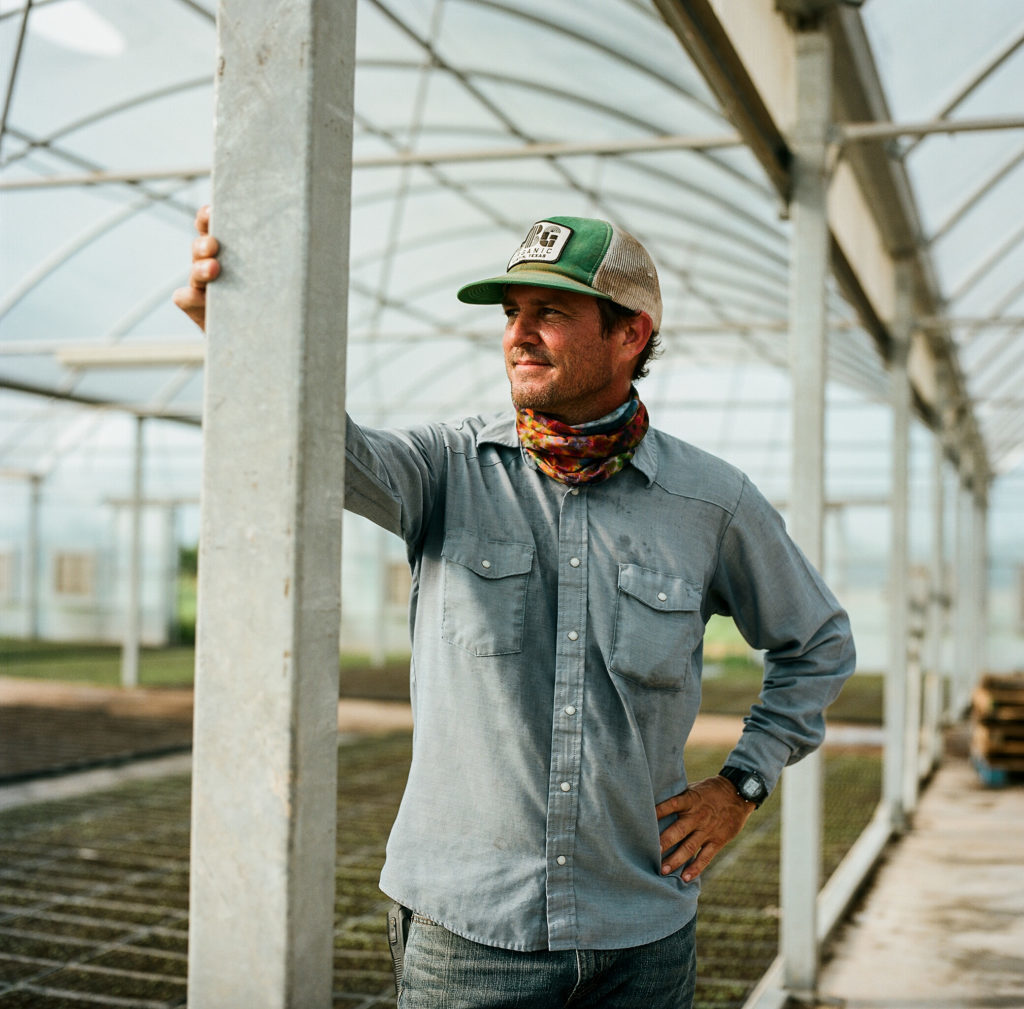 Brenton in the greenhouse. Photo by Tamir Kalifa.
Brenton in the greenhouse. Photo by Tamir Kalifa.
What's the best produce to grow in a home garden in Texas? And when do you plant it?
It really depends on your location, especially with the amount of shade or sun. If it's summertime and sunny - tomatoes are the tastiest, but not necessarily the easiest. You have to plant them at the right time, get plenty of sun + fertility, and nail down proper watering. The easiest to cultivate in Texas heat are peppers, eggplant, okra, and basil. The hardest for home gardeners are squash and zucchini because of the insect problem. Dang squash vine borers.
What do you do with avocados after they sprout? Transplant? Leave in water?
Avocados don’t really grow well in Austin - it’s too cold here. Save yourself the trouble and don’t try to grow avocados in Austin.
When should I plant sweet potatoes?
If you want to plant early and already have your own slips - start in April. The Natural Gardener might have slips for sale in April. However, If you are making your own slips - start 6 weeks ahead of time. We usually plant them in 2 inches of sandy soil and cover them with black plastic to warm up the ground. In a couple weeks, the slip will poke through the plastic (having grown about 2/3 inches), we snag them, and then we transplant them!
Sweet potatoes take about 100 days to mature and usually finish around November. So, the last planting day would be 100 or 110 days before November.
What works best in Dallas? For a home farm or just simple plants?
For a home farm get fruit trees started. The best ones for the Dallas area would be pomegranate, fig, persimmon, and Kiefer pear.
Does a full-time farmer ever get time off?
I use to work all the time because I loved it so much. Then I realized I was working my life away and worked myself out of a marriage.
I realized over the past couple of years, I need to take time off... this summer I've been to Alabama to sail with family, and just got back from ten days in Costa Rica surfing, zip lining, and having tons of adventures with my kiddos. It's been really important for me to try and balance work with play over the past few years. I've been blessed to go on some pretty awesome little journeys. In the beginning, you are building your business and working so hard. I have been full-time farming for 10 years now. Eventually, if you build a good team, everybody can take a break sometimes and folks can cover for other people.
 On a recent trip to Alabama with family. Photo by Brenton Johnson.
On a recent trip to Alabama with family. Photo by Brenton Johnson.
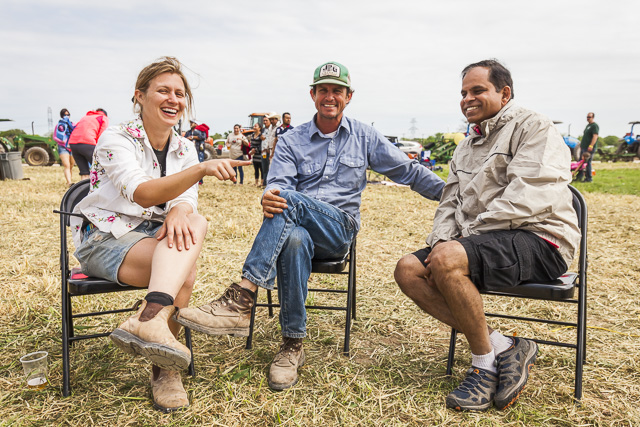 Teamwork, yeah! Photo by Scott David Gordon.
Teamwork, yeah! Photo by Scott David Gordon.
What do you think the minimum scale is for a farm to generate sustainable income for the farmer?
To be honest, a single person farm could probably make it. It's really dependent on the farmer and how good they are at making money. If you live in a good market, have strong direct sales to grocery stores and restaurants... you can definitely make a living. The better you are the smaller the farm can be.
It would desirable to at least have an acre or two, and not be SO small. As a part-time job, you can do with even less and make around $500 a week in a backyard garden selling to markets and what-have-you. Having some tools also make it less labor intensive, but with a really small space you aren't going to use (or more realistically have space for) a mini-Kubota, so you have to do it by hand which can be really tiring.
If you had a theme song, what would it be?
Rock You Like A Hurricane
What are your favorite sources of farming advice/information?
The bible for me is New Organic Grower by Eliot Coleman. Another good one is How to Grow More Vegetables: Than You Ever Thought Possible on Less Land Than You Can Imagine by John Jeavons. Finally, grab Sustainable Vegetable Production From Start-Up to Market by Grubinger. Those are all invaluable reads.
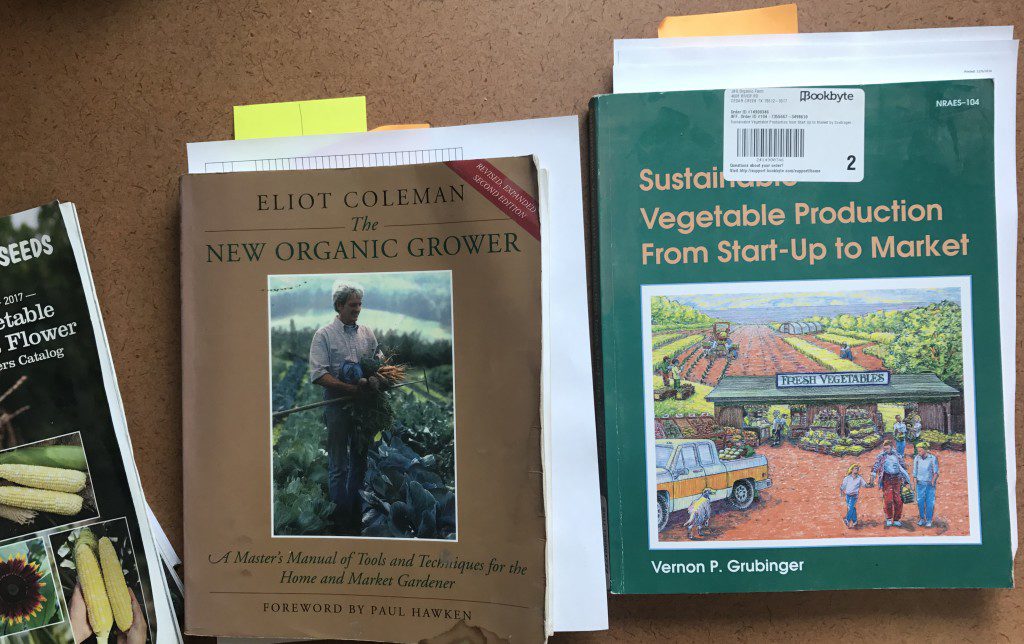 Farm publications worth reading over.
Farm publications worth reading over.
What would you tell someone considering the move from backyard gardening to farming for the masses?
I will quote an old Grateful Dead song here, “keep your day job, until your night job pays.” That’s what I did at least. I worked a day job and kept my veggie job as a hobby. Then when I felt I could support my family, I made the leap. Educate yourself and talk to other farmers to get more insight. There is a great survey in the aforementioned Grubinger book that evaluates a bunch of lifestyle questions… check it out. It helps you make decisions and assesses if you are suited for farming as a career. It’s not easy running your own business... you will put in a lot more hours than if you were working for someone else.
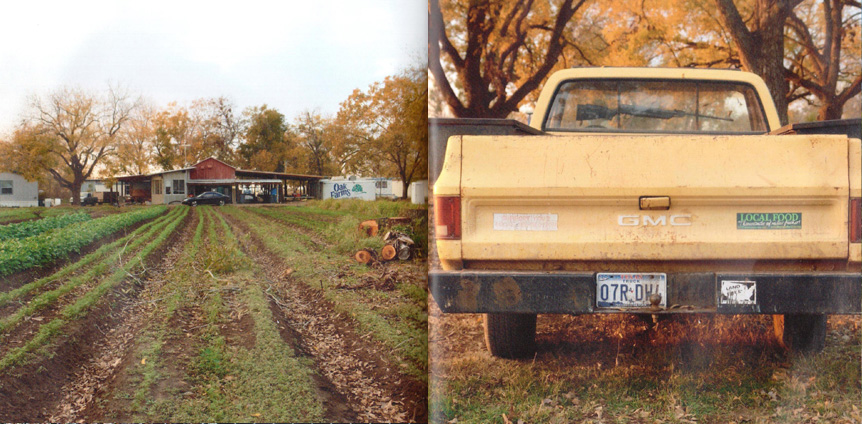 Old photos from about 10 years ago at Hergotz.
Old photos from about 10 years ago at Hergotz.
Are you laying subsurface drip, if so, how do you lift it out?
Yes, we bury it an inch deep, so it's shallow enough where we can lift it out by hand.
How do you grow lettuce and spinach in this heat?
We don’t grow spinach just yet, and we are just starting lettuce now in the fields. We don’t grow outside the recommended windows of time (fall + winter). We push it sometimes, but not too much.
Any upcoming events at the farm?
Oh yes! Save the date for our Fall Open House on Saturday, October 27th! We are also having another Volunteer Day on Saturday, September 22nd because the last one was so much fun. E-mail the farm at farm@jbgorganic.com to RSVP! Spots go fast.
Do you ever meditate?
No, but I should. Does running count?
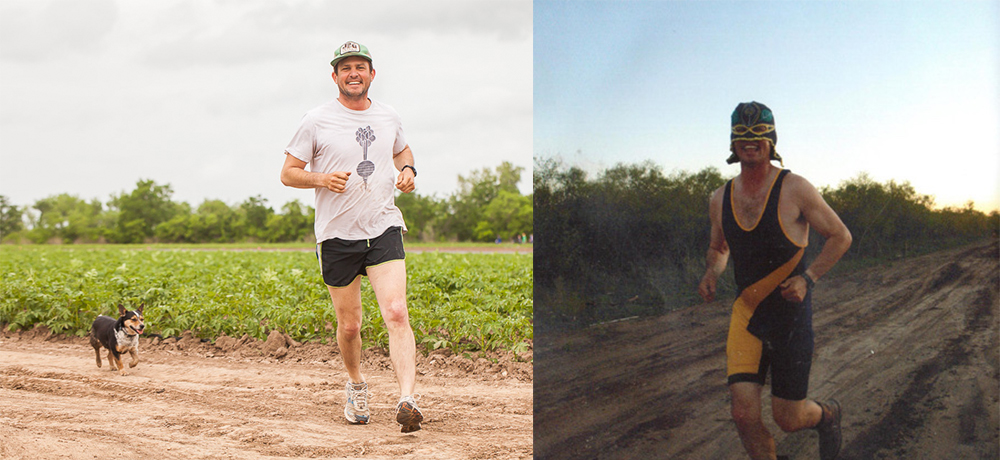 Brenton meditating?
Brenton meditating?
What’s your favorite Grateful Dead song?
I honestly don't have a favorite. What a really enjoy about the Grateful Dead when I first discovered them was the experience and all the energy. I grew up in a conservative Alabama town, and the Grateful Dead was the complete opposite of everything I knew. I didn't like the music that much in the beginning, but it grew on me over time. They introduced me to so many different types of American music. They have so many elements of rock and roll, country, blues, disco, jazz in their music, and a gamut of slow songs, fast songs, everything in between. I also really enjoyed that you never knew/know what they are going to play. No show is ever the same. It all based on feeding off of each other and improvising. Kind of like we do at the farm... plans never work out in reality, so we just make things work with tons of improvisation.
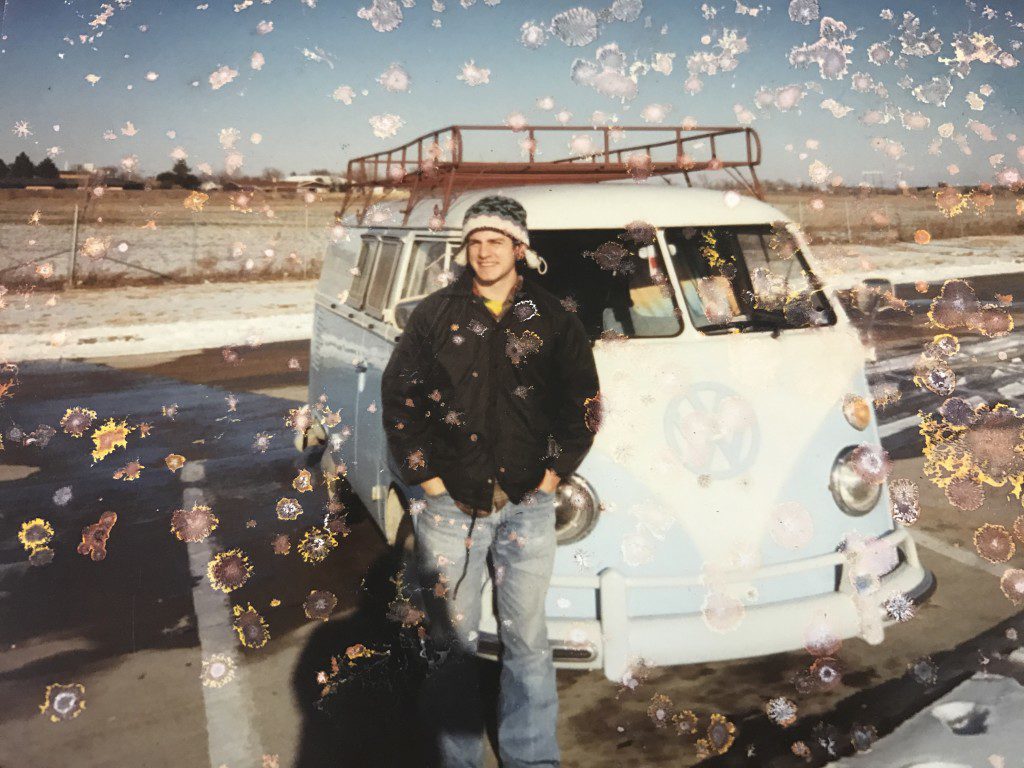 Brenton 20 years ago in his Grateful Dead touring days.
Brenton 20 years ago in his Grateful Dead touring days.
What crop are you most excited about that is coming up, and what’s your fave way to cook?
The older I get, the healthier and spicier I like things. This year, I've been enjoying smoothies, soups, and a lot of veggie grilling. I've been incorporating those grilled veggies into other dishes as well. No matter what, I will always have a real strong affinity to Southern, Mexican, and Cajun cooking. I'm excited about cauliflower... it's coming soon! Looking forward to it.
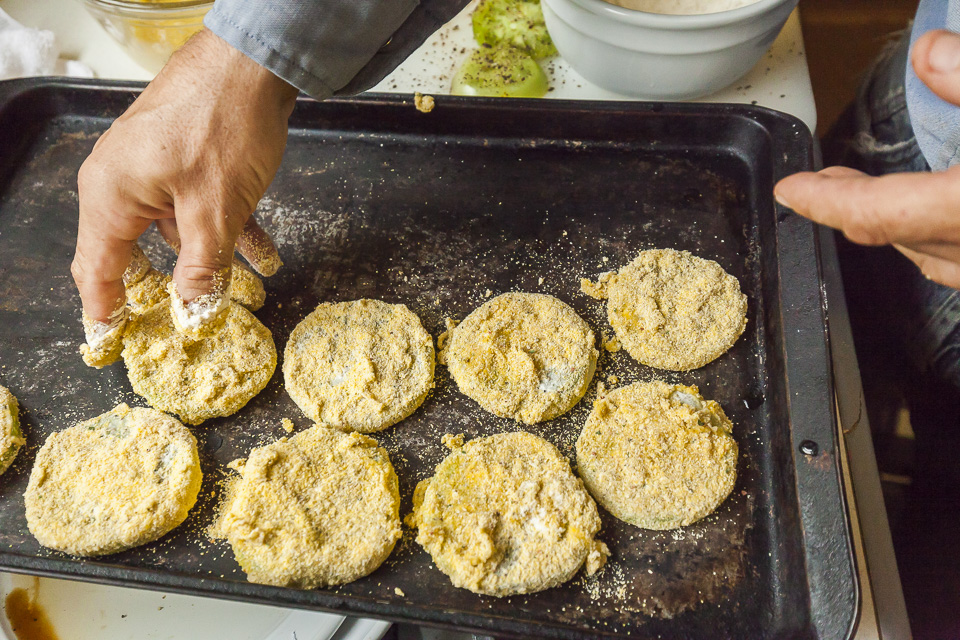 Brenton making his famous fried green tomatoes. Photo by Scott David Gordon.
Brenton making his famous fried green tomatoes. Photo by Scott David Gordon.
 Cauliflower! Photo by Scott David Gordon.
Cauliflower! Photo by Scott David Gordon.
What crop improvements at the farm are you most proud of this year?
We put a LOT of research into veggie variety this year and changed some things up. We pored over seed catalogs and really tried to plan smart. Most notably, we ended up having some really good varieties of watermelon that were really successful in the field and at the market.
What’s the biggest mistake you’ve made farming this past year?
There have been so many of them - I can’t figure out which one is worth mentioning. It's how farming goes.
Why did you decide to farm organically?
Hmm, the main and top reason is for my kids’ and family’s overall health.
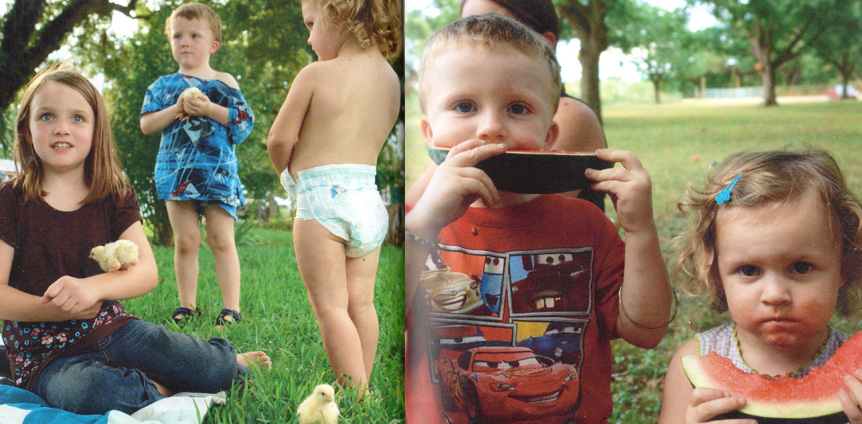 The Johnson kiddos a long time ago, eating organically and enjoyin' the farm life.
The Johnson kiddos a long time ago, eating organically and enjoyin' the farm life.
What is your favorite vegetable and what is your favorite field/area of the farm?
My favorite field would be the original 40 acres at Hergotz. That farm has great drainage, great soil, and is situated right by the river. My favorite vegetable is hard to choose. It always changes every year. I tend to favor the one that we have the best success with and has the best quality.
Do you think it’s possible to farm at scale without animal inputs?
Yes. You absolutely don't need any animal inputs to farm veggies. For us, instead of animal inputs for fertility in an organic system, you can buy nutrient-packed meal (like corn seed or alfalfa) or to save some cash (meal can be pretty pricey), you can grow your own fertility with cover crops.
My cover crop spiel: Lots of nutrients are left in the soil at the end of cropping cycles. For example, when we put down a layer of compost for a squash crop, the crop doesn’t necessarily utilize all the nutrients readily available in the soil during it’s life cycle. Nitrogen, an integral element for vegetable farming and all gardening in general, is water soluble so it’ll wash away (this is something that is especially important to note for us because our farm is situated next to a couple waterways); so, the cover crop will sop up the nutrients and fix the nitrogen for the next crop cycle. When we go through, mow, and till the crop back into the soil, microorganisms within the soil feed on the raw organic matter and break it down. The composted and broken down remains of the cover crops are known as humus, which is rich in minerals essential for plant health. All of this maintains a healthy microbiome in the soil, and if you maintain this, it helps prevent disease and benefits the next round of crops exponentially. Maintaining a healthy microbiome is a very important tenant in organic farming.
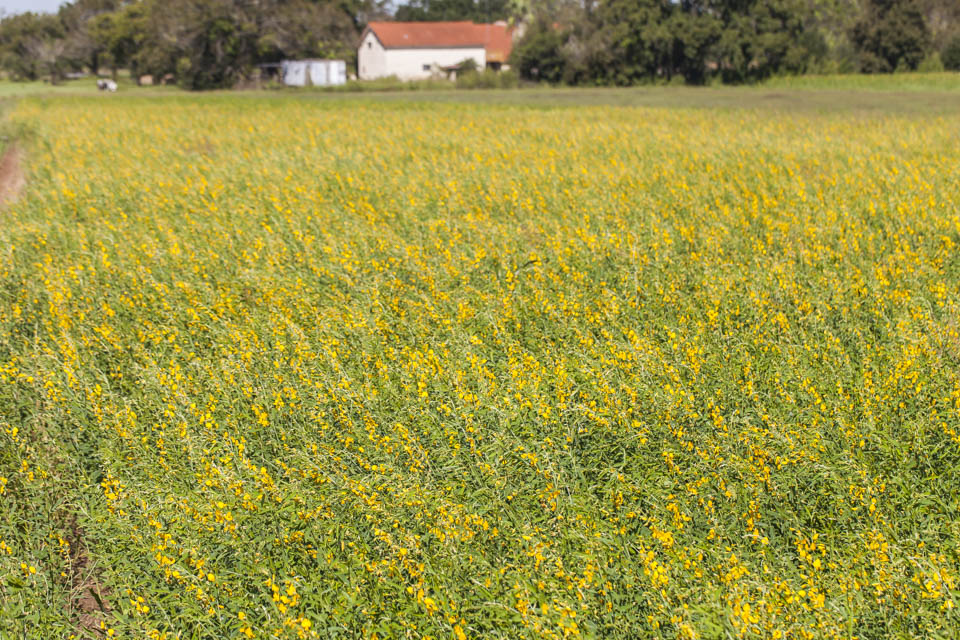 Sunn hemp is a popular cover crop. Photo by Scott David Gordon.
Sunn hemp is a popular cover crop. Photo by Scott David Gordon.
What’s the hardest thing to grow?
A lot of things are hard to grow in Texas because the weather is so variable. Hard crops, we quit growing because they are so risky. For example, fall green beans and fall potatoes are really risky, so we just don't grow them anymore. Onions are the hardest because of insects and weather.
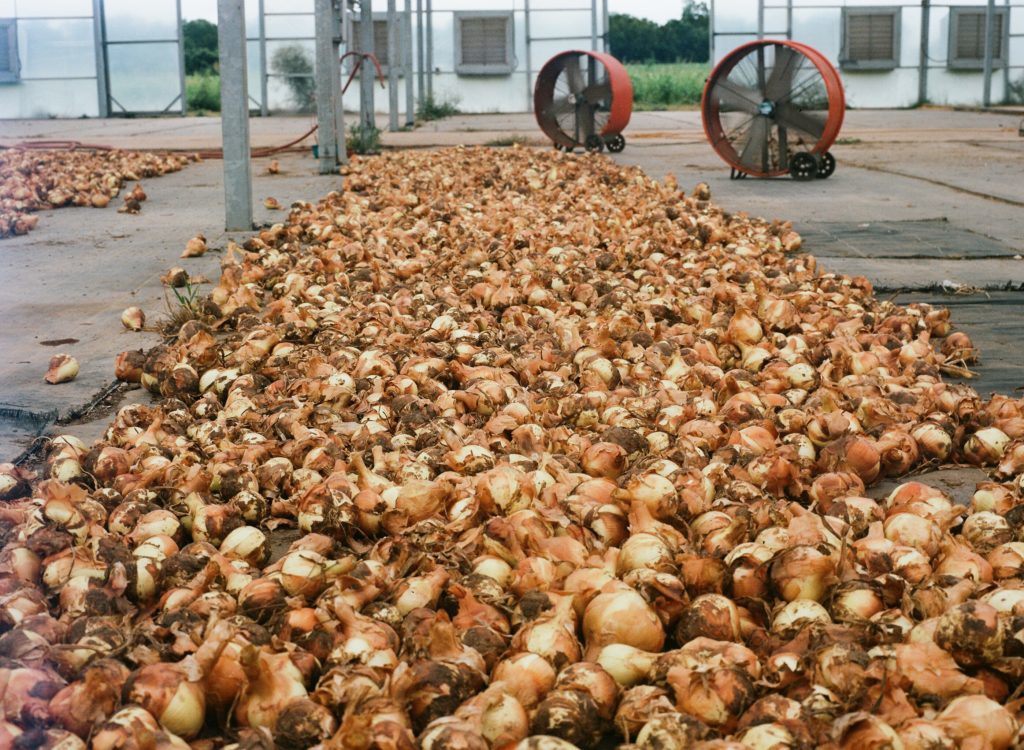 The great onion curing. Photo by Megan Winfrey.
The great onion curing. Photo by Megan Winfrey.
Thanks again for participating, folks! 'Til next time.






 0 ITEMS IN CART
0 ITEMS IN CART 
